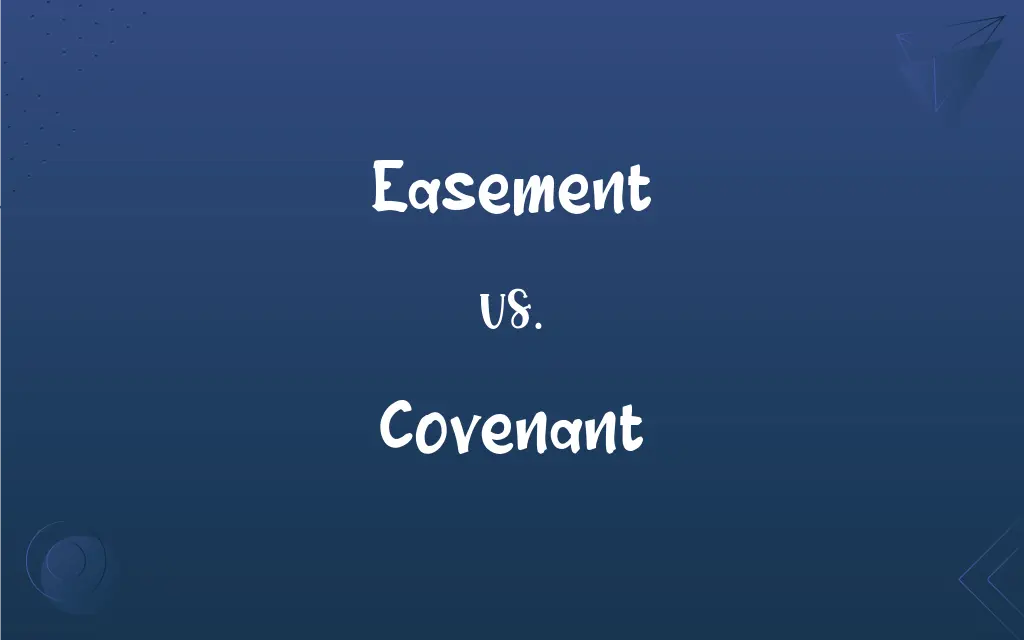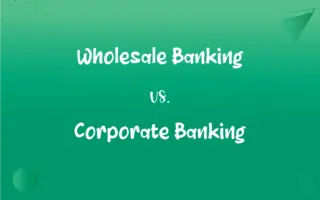Easement vs. Covenant: What's the Difference?
Edited by Aimie Carlson || By Harlon Moss || Published on December 2, 2023
An easement is a right to use another's land for a specific purpose, while a covenant is a written agreement imposing restrictions or obligations on the use of a property.

Key Differences
Easements grant a non-possessory interest in another's land for a particular use, like right of way. On the other hand, covenants are legal agreements or restrictions written into a property's deed affecting the land use or building standards.
Easements often involve access rights, such as utility or driveway access over someone else's property. While, covenants might dictate architectural styles, colors, or landscaping requirements in a neighborhood.
Easements can be created for public utilities or private parties and often pass with the land sale. Covenants, typically found in planned communities, bind current and future property owners to certain conditions.
Easements are usually focused on usage rather than ownership, often granting limited rights. However, covenants can encompass a broader range of restrictions and are often used to maintain neighborhood uniformity and property values.
Violation of an easement might result in legal disputes about access rights, while breaching a covenant could lead to lawsuits or fines based on the terms of the agreement.
ADVERTISEMENT
Comparison Chart
Nature
Right to use another’s land
Legal agreement or restriction
Purpose
Specific use like access or utility lines
Restrict or dictate property use or appearance
Creation
Can be created by use, agreement, or law
Formed through written agreements in deeds
Binding
Generally binds all future property owners
Binds current and future owners
Enforcement
Resolved through access rights disputes
Governed by legal actions for violations
ADVERTISEMENT
Easement and Covenant Definitions
Easement
Easement is a right to cross or otherwise use someone else's land for a specific purpose.
They granted an easement for the electric company to install power lines.
Covenant
A covenant is a written agreement or promise in a deed that imposes restrictions on land use.
The covenant prohibits building structures over two stories high.
Easement
Easements can be for public utilities or private use.
A public easement was set for sidewalk construction.
Covenant
Covenants can include conditions, restrictions, or privileges on property.
A covenant in the deed allows only residential use of the land.
Easement
Easements are often permanent and transfer with the property sale.
The property was sold with an existing easement for water access.
Covenant
It is a legal obligation to do or not do something related to property.
The covenant requires homeowners to maintain their lawns.
Easement
It is a property interest that allows the use of land without owning it.
The easement allows neighbors to use the driveway for access.
Covenant
Covenants are used to maintain standards and uniformity in communities.
The neighborhood covenant sets architectural design standards.
Easement
The act of easing or the condition of being eased.
Covenant
Breach of a covenant can result in legal actions or fines.
Violating the covenant's color scheme led to a lawsuit.
Easement
Something that affords ease or comfort.
Covenant
A binding agreement; a compact.
Easement
(Law) A right to make limited use of another's land, such as a right of way.
Easement
(law) An interest in land which grants the legal right to use another person's real property (real estate), generally in order to cross a part of the property or to gain access to something on the property (right of way).
The power company has an easement to put their electricity poles along the edge of this land.
Easement
(architecture) An element such as a baseboard, handrail, etc., that is curved instead of abruptly changing direction.
Easement
(archaic) Easing; relief; assistance; support.
Easement
The act of relieving oneself: defecating or urinating.
Easement
(model railroading) Transition spiral curve track between a straight or tangent track and a circular curved track of a certain radius or selected radius.
Easement
Gratification. en
Easement
That which gives ease, relief, or assistance; convenience; accommodation.
In need of every kind of relief and easement.
Easement
A liberty, privilege, or advantage, which one proprietor has in the estate of another proprietor, distinct from the ownership of the soil, as a way, water course, etc. It is a species of what the civil law calls servitude.
Easement
A curved member instead of an abrupt change of direction, as in a baseboard, hand rail, etc.
Easement
(law) the privilege of using something that is not your own (as using another's land as a right of way to your own land)
Easement
The act of reducing something unpleasant (as pain or annoyance);
He asked the nurse for relief from the constant pain
Easement
Easements can be created by agreement, necessity, or long-term use.
A legal easement was established due to historical use of the path.
FAQs
What is a right-of-way easement?
A right-of-way easement allows someone to pass through another's property.
Can an easement be terminated?
Yes, an easement can be terminated through various means, including expiration, mutual agreement, or non-use.
What is an easement?
An easement is a legal right to use another's land for a specific limited purpose.
Can easements be transferred?
Easements are generally attached to the land and transfer with it.
What is an easement by necessity?
An easement by necessity is created when it's essential for accessing a landlocked property.
Can an easement be challenged in court?
Yes, easements can be challenged or modified through legal proceedings.
How is an easement created?
Easements are typically created through a written document, such as a deed or will.
What is a utility easement?
A utility easement is a type of easement granted to utility companies to install and maintain infrastructure on private property.
Is an easement permanent?
Some easements are permanent, while others are temporary or conditional.
How does an easement affect property value?
Easements can either decrease or have a neutral impact on property value, depending on their nature and use.
How is a covenant enforced?
Covenants are enforced through the legal system, often by seeking an injunction or damages.
Can a covenant be temporary?
Yes, some covenants are designed to last only for a certain period or until certain conditions are met.
Can a covenant be removed?
Covenants can be removed or modified through a legal process, usually requiring a court order.
What is the difference between a covenant and an easement?
A covenant is a binding agreement or restriction regarding property use, while an easement is a right to use another's land for a specific purpose.
What happens if a covenant is breached?
Breaching a covenant can lead to legal action, including damages or an injunction to enforce the covenant.
What is a covenant in property law?
A covenant is a legal promise or agreement in a deed or other legal document, especially regarding the use of the property.
What is a restrictive covenant?
A restrictive covenant limits what a property owner can do with their land.
Are covenants binding on future property owners?
Yes, covenants typically run with the land and bind future owners.
What is a positive covenant?
A positive covenant requires a property owner to take certain actions, like maintaining a fence.
How are covenants created?
Covenants are created through written agreements, often included in a property's deed.
About Author
Written by
Harlon MossHarlon is a seasoned quality moderator and accomplished content writer for Difference Wiki. An alumnus of the prestigious University of California, he earned his degree in Computer Science. Leveraging his academic background, Harlon brings a meticulous and informed perspective to his work, ensuring content accuracy and excellence.
Edited by
Aimie CarlsonAimie Carlson, holding a master's degree in English literature, is a fervent English language enthusiast. She lends her writing talents to Difference Wiki, a prominent website that specializes in comparisons, offering readers insightful analyses that both captivate and inform.







































































